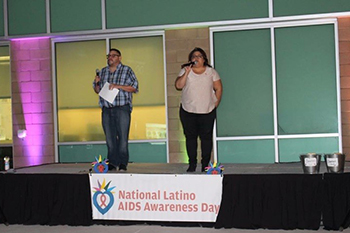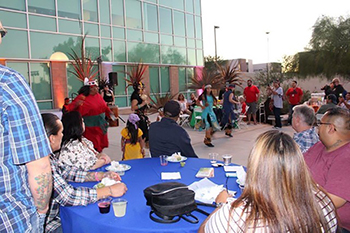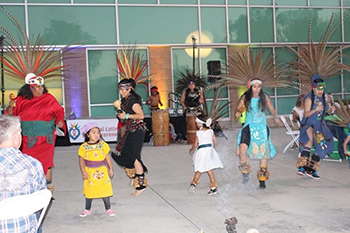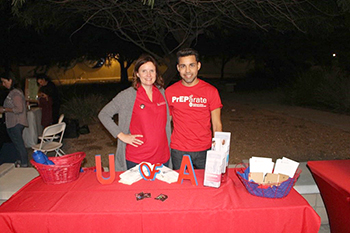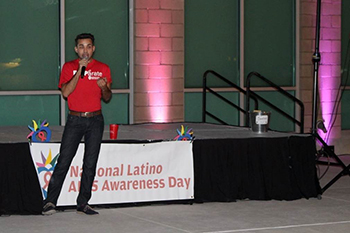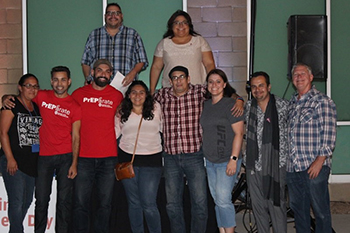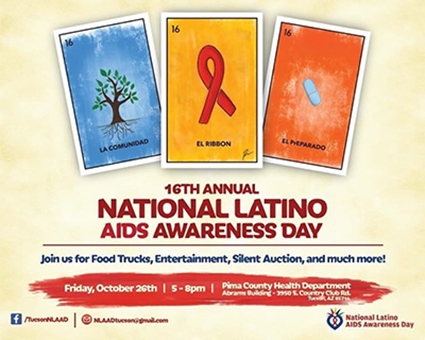 The University of Arizona Petersen HIV Clinics, a clinical care and outreach program hosted by the UA Division of Infectious Diseases at Banner – University Medical Center Tucson and South, sponsored a table at local festivities for the 16th Annual National Latino AIDS Awareness Day (NLAAD) held Oct. 26 at the Abrams Public Health Center, 3950 S. Country Club Road.
The University of Arizona Petersen HIV Clinics, a clinical care and outreach program hosted by the UA Division of Infectious Diseases at Banner – University Medical Center Tucson and South, sponsored a table at local festivities for the 16th Annual National Latino AIDS Awareness Day (NLAAD) held Oct. 26 at the Abrams Public Health Center, 3950 S. Country Club Road.
The clinics, which receive funding from a variety of sources including a grant from the Health Resources and Services Administration through the U.S. Department of Health and Human Services, were among several collaborating groups supporting the event that included the Pima County Health Department, COPE Community Services Inc., El Rio Community Health Center, Gilead Sciences Inc., Southern Arizona AIDS Foundation, Tucson Interfaith HIV/AIDS Network, and ViiV Healthcare.
NLADD was established in the early 2000s as a means to mobilize Hispanic/Latino efforts towards HIV prevention and education. The UA Petersen Clinic is part of the NLAAD Tucson Planning Committee and also hosts an informational table at the event. The table provides information related to UA programs for HIV medical care as well as PrEP and nPEP prevention therapies. Activities include HIV testing, guest speakers, the Christian Barco Community Leadership Award, silent auction, food and other culture presentations. The winner of this year’s community activism award went to Luis Carlos Greer, a local LGBT community advocate.
Shannon Smith, program director for special projects with the UA Division of Infectious Diseases, noted that statistics from the Pima County Health Department, Arizona Department of Health Services and U.S. Center for Disease Control and Prevention show that the Hispanic/Latino community suffers from a higher incidence of HIV/AIDS infections.
“Hispanics are definitely experiencing a disproportionate impact,” Smith said.
-
As of AzDHS’s recent 2018 Arizona HIV Surveillance Annual Report (2017 data), 13.9% of newly diagnosed cases for HIV/AIDS in Arizona occurred among Hispanics. That compares to 36.3% among African Americans, 16% for American Indians/Alaskan Natives and 6.8% for Caucasians.
 In 2017, 113 new cases of HIV/AIDS were reported in Pima County. Of these people (see graphic at right), 51 (45%) identified as Hispanic (44 cases were diagnosed with HIV and 7 were diagnosed with AIDS). According to the AzDHS report, 13.3% of HIV/AIDS cases in Pima County (prevalent cases) are within the Hispanic/Latinos populations. Nationally, from 2011-2015, HIV decreased 14% among Hispanic/Latino women but increased 13% for Hispanic/Latino gay and bisexual men and, more specifically, 19% for Hispanic/Latino gay and bisexual men between the ages of 13 and 24.
In 2017, 113 new cases of HIV/AIDS were reported in Pima County. Of these people (see graphic at right), 51 (45%) identified as Hispanic (44 cases were diagnosed with HIV and 7 were diagnosed with AIDS). According to the AzDHS report, 13.3% of HIV/AIDS cases in Pima County (prevalent cases) are within the Hispanic/Latinos populations. Nationally, from 2011-2015, HIV decreased 14% among Hispanic/Latino women but increased 13% for Hispanic/Latino gay and bisexual men and, more specifically, 19% for Hispanic/Latino gay and bisexual men between the ages of 13 and 24.
Learn more at the “HIV and Hispanics/Latinos” webpage for the U.S. Centers for Disease Control and Prevention: https://www.cdc.gov/hiv/group/racialethnic/hispaniclatinos/index.html
“For the Tucson community specifically, one reason that could explain some of the disparities among Latinos and White men when it comes to new HIV infections is the fact that Latinos are less likely to access biomedical interventions to prevent HIV acquisition,” said Cesar Egurrola, lead clinical coordinator and medical case manager for the Petersen clinics.
“The research project I am currently working on is aiming to explore the reason for this. The first part of our project, where we compared new HIV infections at our clinic vs. new PrEP patients, in an 18-month period, showed that: 63% of newly diagnosed HIV infections were in people of color (compared to 35% white), while 58% of new PrEP patients were white (vs. 29% Latino/Hispanic). Our initial findings suggest that low-income, minority populations in the Tucson community continue to have a higher risk of HIV acquisition.”
That makes awareness, education and outreach efforts such as those during NLAAD more important than ever in Latino/Hispanic communities, Egurrola added.
PHOTO GALLERY (click on image to enlarge — see captions below):
Picture 1: Miguel and Veronica Soto, a brother/sister team that have been leading local NLAAD effort and working in Tucson’s HIV community for years. Miguel works with Pima County Health and Veronica represents COPE Community Services and the Pima County HIV/AIDS Consortium.
Picture 2: Crowd watches native costume dancers.
Picture 3: Native costume dancers.
Picture 4: Brett Dechambre, a clinical coordinator, and Cesar Egurrola, lead clinical coordinator and medical case manager, with the Petersen HIV Clinic.
Picture 5: Cesar Egurrola, Petersen HIV Clinic lead clinical coordinator and PrEP navigator, speaking on NLAAD and HIV/AIDS prevention and treatment programs at the clinics.
Picture 6: Top row — Miguel and Veronica Soto; Bottom row — Krystal Fimbres, EIS Specialist for Petersen HIV Clinic; Cesar Egurrola; Michael Lopez, Southern Arizona AIDS Foundation; Celeste Canchola, COPE Community Services; Joseph Loder, community member; Danielle Orozco, COPE Community Services; Jesse Losoya, Amity Foundation; and Scott Blades, Tucson Interfaith HIV/AIDS Network.


